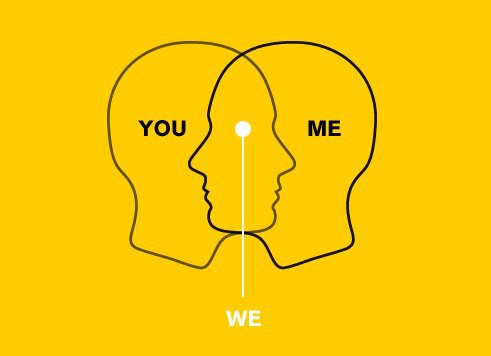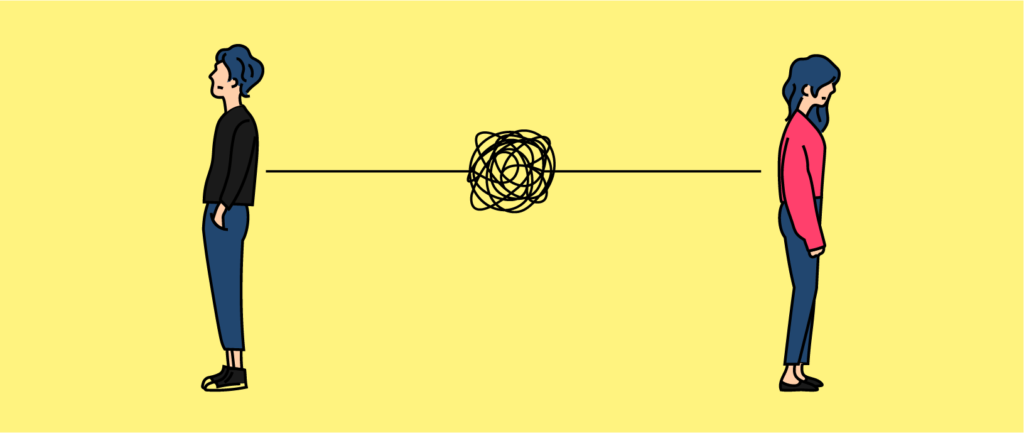Do you ever feel like you do a lot for your partner without getting anything in return? If so, you’re not alone. Many people feel this way in their relationships. This is because of the principle of reciprocity. Reciprocity is the idea that we should repay someone who has done something good for us. Reciprocity in a relationship often manifests as people feeling like they need to do something for their partner after they’ve received a gift or been helped out. While this can be frustrating, it’s also an important part of healthy relationships. In this blog post, we’ll discuss what reciprocity is, why it matters in relationships, and how to make sure it works in your favor.
Contents
- 1 What Is Reciprocity?
- 2 Types of Reciprocity In Relationships
- 3 Positive Reciprocity
- 4 Stages of Reciprocity In Relationship
- 5 Benefits of Reciprocity In Relationship
- 6 Lack of Reciprocity In Relationship
- 7 Signs of Lack of Reciprocity In Relationship
- 8 Causes of Lack of Reciprocity In Relationships
- 9 How To Deal With Lack of Reciprocity In Relationship?
- 10 Conclusion
- 11 A Word From Therapy Mantra
What Is Reciprocity?
 Reciprocity in a relationship is something that is very important. It is the idea that you give something to someone to receive something back. This can be seen as a type of trade or exchange.
Reciprocity in a relationship is something that is very important. It is the idea that you give something to someone to receive something back. This can be seen as a type of trade or exchange.
Reciprocity is often used in relationships because it can help to create a balance. When both people in the relationship are giving and receiving, it can help to make the relationship more equal and fair. It can also help to build trust and goodwill between the two people.
However, reciprocity is not always possible or necessary in all relationships. For example, you may have a close friend with who you don’t feel you need to reciprocate. In this case, reciprocity would not be necessary for the friendship to work well. When reciprocity is not possible or necessary, it is often because the relationship is already balanced in some way. It may also mean that the two people trust each other enough that they don’t feel the need to reciprocate.
Types of Reciprocity In Relationships

There are many types of reciprocity in relationships. Some of the most common include:
Positive Reciprocity
Positive Reciprocity often means that you do something good for someone and they do something good for you in return. This can be a simple act of kindness, such as buying your partner breakfast after they have done the same for you. It also means when you can do something helpful for your partner, such as taking the dog for a walk when they are tired. Sometimes there may be a delay between when you do something good for someone and when they reciprocate, but eventually, they will usually return the favor.
Negative Reciprocity
Negative Reciprocity is often seen as a way of punishing someone. It can involve things such as gossiping about someone behind their back, deliberately ignoring them, or refusing to help them out. Negative reciprocity can also be passive-aggressive, such as giving your partner the silent treatment. This type of reciprocity often happens when there is a conflict in the relationship or when one person feels like they are not getting what they need from the other person. It can also be a way of trying to get back at someone.
Balanced Reciprocity
Balanced Reciprocity is when each person in the relationship gives and receives equally. This can be difficult to achieve, but it often leads to the strongest relationships. It means that both people can trust and rely on each other. When there is balanced reciprocity in a relationship, it often means that both people feel like they are on equal footing. It can also help to prevent conflicts from happening.
Stages of Reciprocity In Relationship

There are many stages of reciprocity in a relationship.
Stage 1
Stage 1 is when the couple is just getting to know each other. They are still trying to figure out if they are compatible and what they want from the relationship.
In this stage, both people must be giving and taking equally. If one person is doing all the giving while the other does nothing, then it will not be a healthy relationship in the long run. In this stage also it has to be equal if not one person will feel used and unappreciated.
Stage II
In stage II, the couple is comfortable with each other. They know what each other likes and doesn’t like. They are secure in the relationship and don’t need to prove anything to each other anymore.
At this point, it is still important that both people are giving and taking equally but it doesn’t have to be perfectly balanced. If one person gives more than the other, the recipient will usually appreciate it more because they know that it’s not something that the other person does all the time.
Stage III
In stage III, the couple has been together for a long time. They know each other very well and they are usually pretty comfortable with each other.
At this point, it is not as important to have an equal balance of giving and taking. If one person gives more than the other, it’s not a big deal because they know that the other person will reciprocate when they can.
It is still important to give and take equally in a relationship but it is more important in the early stages. As the relationship progresses, it becomes less important to have everything be perfectly balanced. Give and take should still happen but it doesn’t need to be equal all the time.
Benefits of Reciprocity In Relationship

There are many benefits of reciprocity in relationships. Some of these are:
Helps to Build Trust
Trust is something that is built over time. If you are always giving to your partner and they are always taking, then it will be hard to trust them. However, if you are both giving and taking equally, then it will be easier to trust each other because you know that neither of you is trying to take advantage of the other. It also has an impact on the level of commitment in a relationship.
Makes the Relationship More Satisfying
When both people are giving and taking equally, it makes the relationship more satisfying for both parties. If one person is always giving and the other is always taking, then eventually the giver will start to feel used and unappreciated. This can lead to resentment and conflict. However, if both people are giving and taking equally, then each person will feel like they are contributing to the relationship and they will be more satisfied with it.
Encourages Communication
If one person is always giving while the other takes, then it can be hard to communicate because the giver may feel like they are being taken advantage of. However, if both people are giving and taking equally, then it will be easier to communicate because each person will feel like they are on the same level. This can help to prevent conflict and misunderstanding. It may also have an impact on the level of intimacy in a relationship.
Improves Relationship Satisfaction
Generally speaking, couples who have a balance of giving and taking are more satisfied with their relationship than those who don’t. This is because each person feels like they are contributing to the relationship and they are getting something back in return. It can also help to build trust and communication. This may have an impact on the longevity of the relationship. It gives a sense of stability.
Helps To Build Strong Relationship
A strong relationship is one where both people are giving and taking equally. If one person is always giving while the other takes, then it will be hard for the relationship to thrive. However, if both people are giving and taking equally, then it will be easier for the relationship to flourish. This is because each person feels like they are a part of it and that their contributions matter. It also helps to build trust and communication. These are essential components of a strong relationship.
Lack of Reciprocity In Relationship
Lack of reciprocity is often the result of different love languages. It can also be the result of different levels of commitment or even just a difference in personality. If you find yourself always giving and never receiving, it’s important to communicate with your partner about what you need. It’s okay to ask for what you want, and it’s okay to expect that your needs will be met. Relationships are give-and-take, and if yours isn’t balanced, it might be time to reconsider the relationship itself.
There can be many reasons for a lack of reciprocity in relationships. It could be that one person loves giving more than receiving, or it could be that one person simply doesn’t feel comfortable asking for what they need. If you’re not getting what you need from your relationship, talk to your partner about it. Let them know how important it is to you and see if there’s anything they can do to help make things more reciprocal. No one is perfect, and everyone needs a little help sometimes. Don’t be afraid to ask for what you want–your partner will likely appreciate your honesty and openness.
Signs of Lack of Reciprocity In Relationship

There are many signs of a lack of reciprocity in a relationship.
- One sign is when you find yourself always giving and your partner always taking. This can be seen in relationships where one person is always doing the favors, or giving more attention, while the other person seems to be constantly busy with work or other commitments.
- Another sign is when you feel like your partner doesn’t really care about your needs and wants, and only focuses on their own.
- Another big sign of lack of reciprocity is feeling like you’re being taken for granted by your partner. If you feel like this then it’s time to have a talk with them about what’s going on and how you’re feeling. It also might be time to reconsider your relationship if you feel like you’re not being treated fairly.
Causes of Lack of Reciprocity In Relationships

There are many causes of lack of reciprocity in relationships. Some of these are:
Anger or Resentment
Anger or resentment is something that can easily cause a lack of reciprocity in relationships. When one person feels like they are not being treated fairly, it can lead to them withdrawing and not giving back what they have received. This will then create a cycle where the relationship becomes unbalanced and unhappy. There can also be a lot of bitterness and resentment if one person feels like they are always giving and not receiving anything in return.
Lack of Communication
If there is a lack of communication in a relationship, it can often lead to a lack of reciprocity. This is because when there is no communication, it becomes difficult for couples to understand what the other person needs or wants. This can then cause frustration and misunderstandings, which can lead to one person feeling like they are not being appreciated. Without effective communication, it can be very hard for couples to maintain balance in their relationships.
Poor Boundaries
When people do not have strong boundaries, it can often lead to a lack of reciprocity in relationships. This happens because people will often take advantage of others who do not have strong boundaries. They will often take more than they give, and this can lead to the other person feeling used and taken for granted. This can be a major problem in relationships, as it can often lead to one person feeling like they are being exploited.
Selfishness
One of the main causes of lack of reciprocity in relationships is selfishness. When one person is always focused on their own needs, it can often lead to them taking more than they give. This can leave the other person feeling unimportant and unappreciated. Selfishness is a major problem in many relationships, as it can often lead to one person feeling like they are being used by the other.
Expectations
When someone enters into a relationship, they often bring with them certain expectations about how things should be. If these expectations are not met, it can lead to feelings of frustration and resentment. These negative emotions can then cause a lack of reciprocity in the relationship. It can also be difficult to maintain balance in a relationship if one person is always expecting more than the other is able to give.
Insecurity
Insecurity is another common issue that can contribute to a lack of reciprocity in relationships. People who feel insecure often find it difficult to trust others and may fear that they will not be treated fairly. This can lead to them taking more than they give and not being able to reciprocate the love and support that is given to them. There can be a lot of insecurity in relationships, as people often feel like they are not good enough for the other person.
How To Deal With Lack of Reciprocity In Relationship?

There are many ways to deal with the lack of reciprocity in a relationship. Some of these are:
Confront Your Partner
You should always confront your partner if you feel like they are not reciprocating in the relationship. This will help to clear the air and allow you to communicate better. Sometimes there may be valid reasons why your partner is not reciprocating, and this can be sorted out through effective communication. It can also have an overall positive effect on the relationship, as it can help to improve communication and understanding.
Assert Yourself
If you find that your partner is not reciprocating, you should assert yourself. This means that you should make it clear to them what you need and want from the relationship. You should also be clear about your boundaries and what you are willing to give. Asserting yourself can be a difficult thing to do, but it is important to remember that you have a right to be in a happy and healthy relationship.
Set Boundaries
It is important to set boundaries in any relationship. This will help to ensure that both partners know what is expected of them. If one person feels like they are always giving more than they are receiving, it can be helpful to set boundaries. This will help to create a more balanced relationship and ensure that both partners are treated fairly. There can be many different types of boundaries, and it is important to discuss these with your partner.
Give And Take
One of the most important things to remember in any relationship is that it should be a give and take. Both partners should be able to give and receive love and support. If you find that you are always giving more than you are receiving, it may be time to reassess the relationship. It is important to make sure that both partners are happy and fulfilled in the relationship. It may be necessary to make some compromises in order to maintain balance.
Try To Understand
It is important to try to understand your partner if they are not reciprocating. This means that you should take the time to listen to them and understand why they may be acting this way. It is possible that there are valid reasons why they are not reciprocating, and it is important to hear them out. If you can understand where your partner is coming from, it can help to improve the relationship. There can be many different reasons why a person may not reciprocate, and it is important to try to understand them.
Conclusion
Reciprocity is one of the most important things in any relationship. When it is absent, it can lead to feelings of frustration and resentment. It is important to confront your partner if you feel like they are not reciprocating in the relationship. You should also assert yourself and set boundaries. These things can help to create a more balanced and healthy relationship. Remember that it should be a give and take. both partners should be able to give and receive love and support. If you find that you are always giving more than you are receiving, remember that there are ways to deal with this problem. Balance is key in any relationship, so make sure that both partners are treated fairly. Communication is also important in order to maintain a healthy and happy relationship.
A Word From Therapy Mantra
Your mental health — Your psychological, emotional, and social well-being — has an impact on every aspect of your life. Positive mental health essentially allows you to effectively deal with life’s everyday challenges.
At TherapyMantra, we have a team of therapists who provide affordable online therapy to assist you with issues such as depression, anxiety, stress, workplace Issues, addiction, relationship, OCD, LGBTQ, and PTSD. You can book a free therapy or download our free Android or iOS app.


